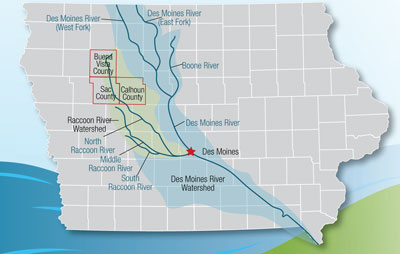 Bill Stowe, CEO and General Manager of the Des Moines Water Works was the featured speaker at First Presbyterian Church in Cedar Rapids on November 4. Iowa is in a water quality crisis. In 2015, more Iowa beaches were closed due to unsafe bacterial levels than ever before, and the Iowa Department of Natural Resources reported a record number of Iowa waterways failing to meet water quality standards (“impaired waters”). Bill Stowe spoke on the central Iowa utility’s mission to provide safe, affordable and abundant drinking water to 500,000 customers and the challenges faced in an agricultural watershed. The Des Moines Water Works is suing three Iowa County Boards of Supervisors that manage drainage districts with high concentration of nitrates. Those drainage districts discharge tile drainage water into the Raccoon River, the primary water source for Des Moines, Iowa’s capital city. Stowe says, “Our theory is that the drainage districts are point-source polluters under the Federal Clean Water Act and a nuisance under Iowa law.” The case is currently scheduled to go to trial in June of 2017. Nitrate pollution has been the “topic de jure,” as Stowe called it, since the Des Moines Water Works sued three northwest Iowa counties in 2015, arguing underground field tiles act as conduits carrying nitrates into the Raccoon River, a prime source of drinking water for the utility’s 500,000 customers. “We’ve had the world’s largest denitrification facility for 25 years — 25 years! — and it’s too small because we’re seeing more nitrate come down the rivers,” Stowe said. The high contamination levels could soon force the utility to build a larger nitrate removal plant at a cost as high as $180 million, he said. The water works set a record in 2015 for the number of days it operated its nitrate-removal equipment, at an operating cost to its customers of $1.5 million. Stowe makes the point that is that he is in the public health business. Water is not electricity, natural gas or cable TV, this commodity is a public health commodity and it is necessary to keep us alive. It is a public health issue when water quality is disparaged. Public confidence must be a concern. Des Moines’ drinking water comes mostly from surface water – the Raccoon River. Suspended solids, microorganisms, and nutrients are the biggest concerns in the water. Geologically, the rich soil of Iowa was left by the Des Moines lobe of glaciation in the Ice Age. This soil is naturally very wet and is now drained to support agriculture. Much of the land is laterally tiled in squares with ten foot centers. This means that the water in the Raccoon River contains significant drainage from agricultural fields and the fertilizers that come with it.
Nitrogen levels have been tracked in the Raccoon River for over 100 years. 50 years ago it was relatively low. Iowa’s problems include the worst surface water quality in the U.S. The DNR’s 2015 list of impaired waterways numbered 725, a 132 percent increase from the 313 impaired waterways listed in 2004. There are more beach advisories now than before, and the hypoxic zone is increasing in the Gulf of Mexico. This is a problem that is here today and growing. In 2012, Iowa released its voluntary Nutrient Reduction Strategy, which calls for science-based practices to be installed across the state. This calls for a 45% reduction in the amount of nitrogen that is lost to the river. Progress is needed. The Des Moines Water Works’ lawsuit is being paid for primarily by ratepayers; their Board has appropriated up to $700,000 for the litigation. They also have a small amount from private donors. They have not sought out large environmental or other benefactors, unlike agricultural interests who have a number of large benefactors supporting the county drainage districts. Background: Stowe is a Phi Beta Kappa graduate of Grinnell College. He received a master’s degree in engineering from the University of Wisconsin, a master’s degree in industrial relations from the University of Illinois, and a Juris Doctor degree from Loyola University Law School. Stowe sits on the board of directors of the Association of Metropolitan Water Agencies, which comprises the largest drinking water utilities in North America. He is a member of the American Society of Civil Engineers and a member of the Iowa State Bar Association. Sources: November 4, 2016, talk by Bill Stowe at First Presbyterian Church in Cedar Rapids; Reporting by Mary Ann Nelson, UMRR Vice Chair http://www.agriculture.com/crops/fertilizers/technology/qa-bill-stowe-ceo-general-mager-of-des_175-ar51492 http://theperrynews.com/water-quality-conversation-asks-how-long-a-wait-who-pays/ http://www.1380kcim.com/news/2016/farm-bureau-and-iowa-corn-growers-propose-fully-funding-legal-defense-in-des-moines-water-works-lawsuit/ Bill Stowe Photo Credits: http://urban-desjm.blogspot.com/ Comments are closed.
|
| LWV Upper Mississippi River Region | UMRR blog |

 RSS Feed
RSS Feed